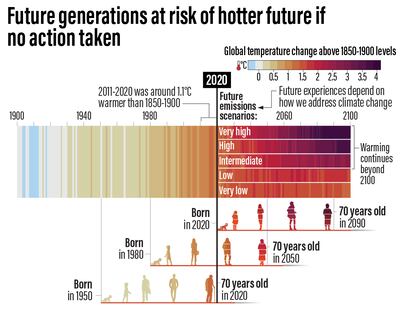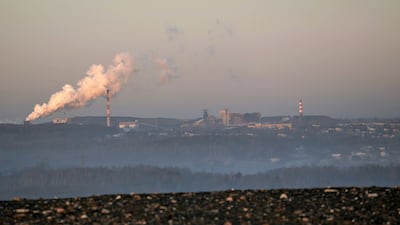Greater action is needed to cut greenhouse gas emissions if the world is to retain any prospect of limiting global temperature rises to 1.5°C above pre-industrial levels, a new report has said.
Officials have called for "deep, rapid and sustained greenhouse gas emissions reductions in all sectors," with the aim of nearly halving emissions by 2030 — instead of allowing them to flatline or even to continue to increase.
The latest Intergovernmental Panel on Climate Change (IPCC) report, released on Monday, said effective measures must be taken to reduce the effects of climate change on poor communities, a process known as adaptation.
The report comes months before the UAE hosts Cop28, where the world is set to undertake a stocktake of commitments made as part of the Paris Agreement, agreed to in 2015.
Ensuring a liveable future
“This Synthesis Report underscores the urgency of taking more ambitious action and shows that, if we act now, we can still secure a liveable, sustainable future for all," Hoesung Lee, IPCC chairman, said in a statement.

According to the IPCC, efforts made so far and plans on the table "are insufficient to tackle climate change".
It said wholesale changes were needed in energy, agriculture, transport, industry, building and land-use to reduce carbon emissions.
Temperatures have already risen to about 1.1°C above pre-industrial levels, causing an increase in extreme weather events, and there is little sign that measures being taken will limit this rise to 1.5°C.
Called a Synthesis Report, the study was written by 93 experts and is the final part of the panel’s sixth assessment since the IPCC was set up in 1988. The report stemmed from week-long discussions at Interlaken in Switzerland.
Bob Ward, from the Grantham Research Institute on Climate Change and the Environment, part of the London School of Economics, said the report made "grim reading".
"We’re almost certain now to exceed 1.5°C during the course of this century, which would have all sorts of devastating impacts," he said.
'Falling off a cliff edge'
The report is based on analysing scientific studies published up to 2019, by which time there was enough fossil fuel infrastructure, Mr Ward said, from coal-fired power stations to petrol-powered road vehicles, to take the world beyond 1.5°C.
"There are still parts of the world that have continued to build more fossil-fuel infrastructure over the past three years," he said.
"The report showed that we were on a cliff edge in 2019 and unfortunately we’ve fallen over the edge. This means we’re probably going to exceed 1.5°C.
"That will result in far more impacts — more devastating heatwaves, coastal flooding and inland flooding caused by high rainfall."

He said this increased the risk that the world would cross thresholds resulting in irreversible climate effects, such as melting polar ice caps.
"That’s a fairly terrible situation for us to be heading for," he said, highlighting the need for heavy investment to make countries more resistant to, for example, extreme weather events.
He also called for strengthened efforts to remove CO2 from the atmosphere and store it.
If annual emissions remain at their current level of the equivalent of 50 to 60 gigatons of carbon dioxide (GtCO2) a year, the world would experience a temperature rise of about 3.2°C above pre-industrial levels, the report warns.
Annual emissions in 2019 were about 54 per cent higher than in 1990, the report states, with 2010 to 2019 seeing the highest level of any decade on record.
If the average temperature increase is to be kept around the 1.5°C mark, annual emissions would have to fall to about 10GtCO2 or fewer by 2050, the IPCC says.
Combating climate change
To cut emissions, the report highlights the importance of increasing investment in solar and wind power.
Mr Ward said one positive of the current situation was that renewable energy sources were often cheaper than fossil fuels.
Other significant contributions, the report says, can be made by reducing methane emissions from coal, oil and gas, by burning biofuels and capturing and storing carbon emissions. Investing in geothermal energy, hydropower and nuclear power is also recommended.
However, the report highlights the importance of much more than an energy transition if the world is to meet its climate goals.
Reducing the conversion of natural ecosystems into agricultural land is regarded as critical, because deforestation and the turning of land over to food production is one of the biggest contributors to climate change. Indeed agriculture, forestry and other land-use issues accounted for about 22 per cent of global greenhouse gas emissions in 2019.
There should be, the report recommends, an increase in carbon capture and storage in agriculture, the restoration of ecosystems and a shift to more sustainable diets. Making buildings and vehicles more efficient and shifting to electric vehicles are other recommendations.

Individuals can play a part, so people should be helped to understand the results of overconsumption so they can make "more informed choices".
A key issue in the report is the effect that climate change is having on the world’s most vulnerable people and ecosystems.
"Climate justice is crucial because those who have contributed least to climate change are being disproportionately affected," Aditi Mukherji, one of the report’s authors, said in a statement.
“Almost half of the world’s population lives in regions that are highly vulnerable to climate change. In the last decade, deaths from floods, droughts and storms were 15 times higher in highly vulnerable regions."
The IPCC said there was a need for "climate resilient development", looking at measures that help communities to adapt to climate change and cutting emissions at the same time. Many such measures, the panel said, have spin-off benefits.
Examples include a focus on low-carbon electrification, walking, cycling and public transport, as these improve air quality and people’s health.
“The greatest gains in well-being could come from prioritising climate risk reduction for low-income and marginalised communities, including people living in informal settlements,” said Christopher Trisos, a report author.
“Accelerated climate action will only come about if there is a manifold increase in finance. Insufficient and misaligned finance is holding back progress.”
Governments should invest in efforts to cut greenhouse gas emissions, while supporting the private sector to do the same, the IPCC stated.
Another recommendation is that between 30 and 50 per cent of the world’s land, freshwater and oceans should be conserved.
Cop28, to be held at Expo City Dubai from November 30 to December 12, is seen by campaigners as an opportunity for nations to show greater ambition in cutting emissions after what some said were disappointing results in emission-reduction commitments from Cop27 in Egypt last year.



